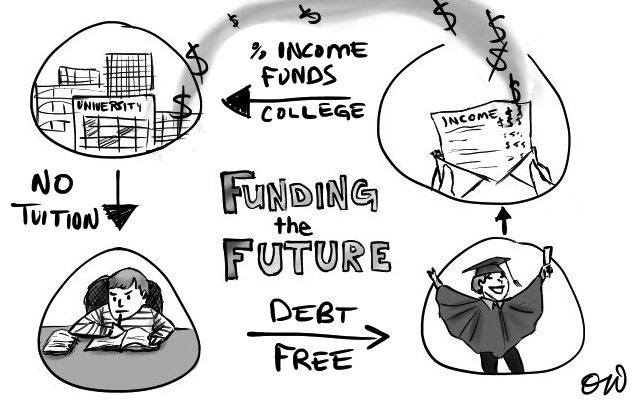Pay It Forward a good program to alleviate student debt
July 16, 2013
If you’ve kept up with news for the last few weeks, you probably have learned interest rates for student loans are on the rise.
But a more optimistic occurrence in the news was Oregon’s State Senate passing H.B. 3472 earlier this month. Called “Pay It Forward,” this outside-the-box program would allow students at community colleges and public universities to enroll in classes for free.
In return, graduates will be expected to pay back a small portion of their income to the universities they attended for about the next 25 years. Finding the initial money to start the program may be an issue, but the proposal is a positive step that will serve students rather than making debt slaves of them with steep interest rates.
There are great reasons why programs like Pay It Forward would be a better system for financing education at NIU. While scholarships and grants are great forms of financial aid, sometimes they can only take you so far.
As for the high costs of tuition and fees, I have always thought it is unhealthy and unreasonable for schools to demand sums so few can actually pay up front.
As a result, graduates often end up in crippling debt before their careers have begun to return on the investment from a college degree.
By going to school for free and later paying it forward to the university, instead of backward to lenders, both current and future students would benefit from this alternative program.
No matter what kind of job you find yourself with after graduation, the amount you would pay back would be proportionate to how much you earn: 3 percent for four-year programs and 1.5 percent for two-year programs.
“I’d probably give back because right after college it’s really hard to pay off student loans,” said senior communications major Emilee Fannon. “It takes years… I wish more states other than Oregon would take this in perspective. I think it would be a great idea for students such as I.”
With the staggering price of higher education today, coupled with the now-insufficient wages of working class jobs, dreams of upward social mobility are receding further from reach for a growing number of Americans.
By implementing Pay It Forward, people without enough money to pay for college will have a better chance to earn degrees in higher education if they want to.
Whether they are fresh out of high school or adults with kids and full-time jobs, more people will have the option of going to school. Anyone who wants a college degree can find ways to earn one, but with this program that opportunity can be given to many more people.







